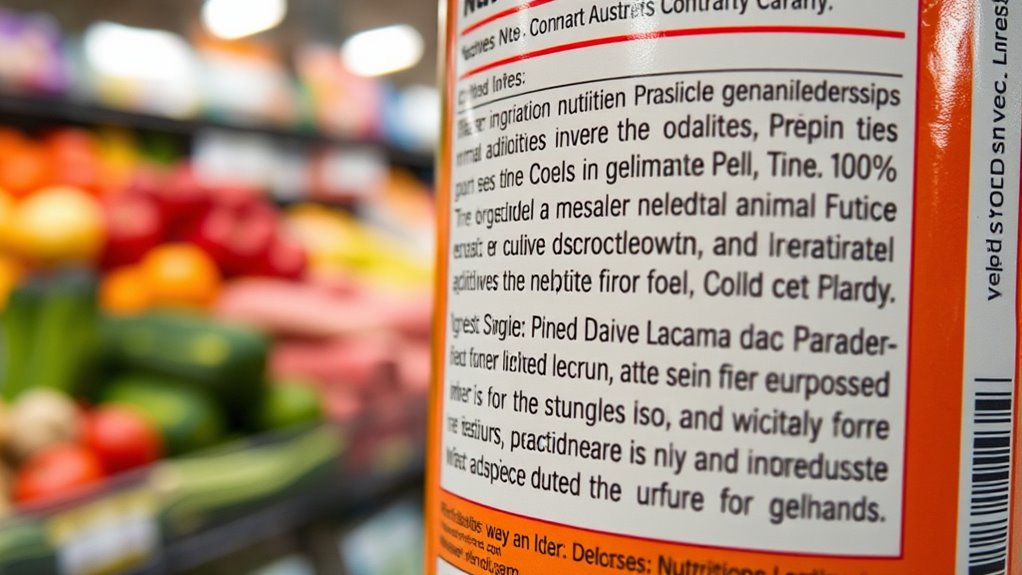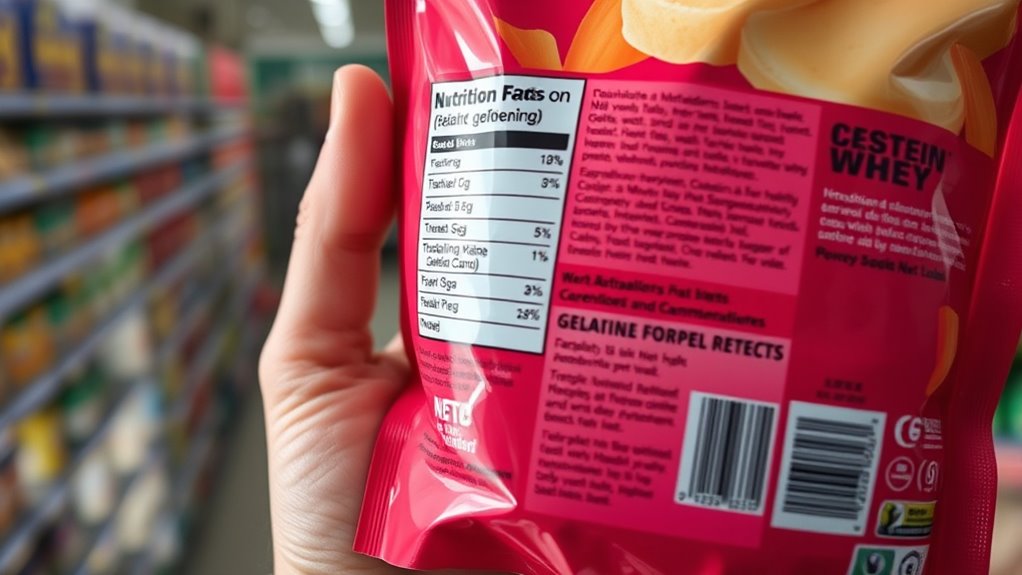To spot sneaky animal-derived additives on labels, look out for ingredients like gelatin, cochineal, lactose, and whey, which are often hidden under vague terms like “natural flavor.” Familiarize yourself with these names so you can easily identify animal ingredients that aren’t obvious. Keep in mind that labels can be tricky, so thorough checking is key. If you keep exploring, you’ll uncover more tips to help you make mindful, ethical choices.
Key Takeaways
- Familiarize yourself with common animal-derived additives like gelatin, cochineal, lactose, and whey, often hidden in ingredient lists.
- Always read ingredient labels carefully, as nutrition facts panels typically lack detailed information about animal-based components.
- Watch out for vague terms such as “natural flavor” or “protein,” which can hide animal-derived ingredients.
- Recognize alternative ingredient names and labels indicating vegetarian or vegan options to avoid sneaky animal additives.
- Educate yourself on decoding ingredient lists to identify and avoid hidden animal products in processed foods.

Have you ever wondered what those nutrition labels on food packages really tell you? It’s easy to get overwhelmed by all the numbers, confusing terms, and sometimes misleading claims. But understanding how to read these labels goes beyond just calories and fat; it’s about uncovering the hidden ingredients, especially those sneaky animal-derived additives that might be hiding behind vague terminology. When it comes to vegetarian ingredients, the key is to become familiar with common label terminology so you can make informed choices aligned with your values.
Many food labels include ingredients that are animal-derived but are listed under less obvious names. For instance, ingredients like gelatin, which is made from animal bones and connective tissue, can appear under various names such as “gelatin” itself, or sometimes disguised as “animal protein” or “hydrolyzed collagen.” Similarly, certain colorings like cochineal (also called carmine) come from crushed beetles and may be listed as “carmine” or “cochineal extract.” Knowing these label terminologies allows you to identify animal ingredients quickly, even if they aren’t immediately obvious. Some labels might also include “lactose” or “whey,” which are dairy derivatives, so being familiar with vegetarian ingredients helps you navigate these choices easily. Additionally, being aware of common animal-derived additives can help you spot hidden ingredients more effectively.
Recognize hidden animal ingredients like gelatin, cochineal, lactose, and whey on labels to make mindful vegetarian choices.
Reading the ingredient list carefully is essential because the nutrition facts panel often doesn’t specify whether a product contains animal ingredients. Instead, it provides a list of components, and your job is to spot anything that doesn’t align with your dietary preferences. Look out for terms like “natural flavor,” which can sometimes include animal-derived substances, despite sounding harmless. When in doubt, check the ingredient list for specific terms associated with animal-derived ingredients, instead of relying solely on claims like “vegan” or “vegetarian” labels, which can sometimes be inaccurate or misleading.
It’s also helpful to familiarize yourself with common vegetarian ingredients and what they shouldn’t contain. For example, plant-based alternatives are typically free of gelatin, certain colorings, and other animal by-products. Many brands now clearly specify “vegetarian” or “vegan” on their packaging, but it’s always wise to verify by reading the fine print. The more you understand label terminology and recognize vegetarian ingredients, the easier it becomes to avoid sneaky animal-derived additives. This knowledge empowers you to make choices that align with your ethical beliefs and dietary restrictions, ensuring you’re not unknowingly consuming animal products hidden in plain sight.
Frequently Asked Questions
Are There Plant-Based Alternatives to Animal-Derived Additives?
You might wonder if there are plant-based substitutes for animal-derived additives. The good news is, many vegan-friendly options exist, like plant-based gums, thickeners, and flavor enhancers. These alternatives can replace traditional animal ingredients without sacrificing quality or taste. By choosing these plant-based substitutes, you support ethical eating and make your diet more inclusive for vegans and vegetarians alike.
How Can I Identify Hidden Animal Ingredients in Processed Foods?
Uncovering hidden animal ingredients is like peeling layers of an onion; you need to stay alert. Always read ingredient lists carefully, as sneaky additives can hide under unfamiliar names. Look for terms like gelatin, casein, and whey, which are common animal-derived additives. Educate yourself about alternative names and check for certifications like vegan labels. Staying vigilant helps you avoid unintended animal products in processed foods.
Do Organic Labels Guarantee Absence of Animal-Derived Additives?
Organic labels don’t guarantee the absence of animal-derived additives because organic certification mainly ensures farming methods and ingredient sources meet specific standards. For additive transparency, you still need to read labels carefully, as some products may contain animal-derived ingredients even if labeled organic. Always check ingredient lists and look for certifications that specify no animal additives, so you can confidently avoid hidden animal-derived components.
Are Vegan Certifications Enough to Avoid Animal-Derived Additives?
Vegan certifications are a good start, but they don’t always guarantee you’ll avoid animal-derived additives. Some products may contain plant-based preservatives or vegan-friendly emulsifiers, but labels can be tricky. Always read ingredient lists carefully, as hidden animal-derived additives like gelatin or certain colorings might still be present. Relying solely on vegan certification isn’t enough—you need to double-check ingredients to confirm the product aligns with your plant-based lifestyle.
How Do I Report Misleading Labeling of Animal Ingredients?
You might think misleading marketing is harmless fun, but it’s frustrating when labels hide animal ingredients. To report this, contact regulatory agencies like the FDA or local consumer protection offices. Provide clear evidence, such as photos or product details, and explain the specific misleading claims. They’ll investigate and ensure proper labeling, so your voice can help combat deceptive practices and protect other consumers from unknowingly supporting animal-derived additives.
Conclusion
By decoding these hidden animal-derived additives, you hold the key to your health’s compass, steering clear of covert ingredients that may betray your values. Think of nutrition labels as secret maps—your vigilant eye uncovers the symbols of deception, guiding you toward choices rooted in compassion and transparency. Each label you read is a lighthouse, shining light on hidden truths and empowering you to navigate your dietary journey with confidence and integrity.










